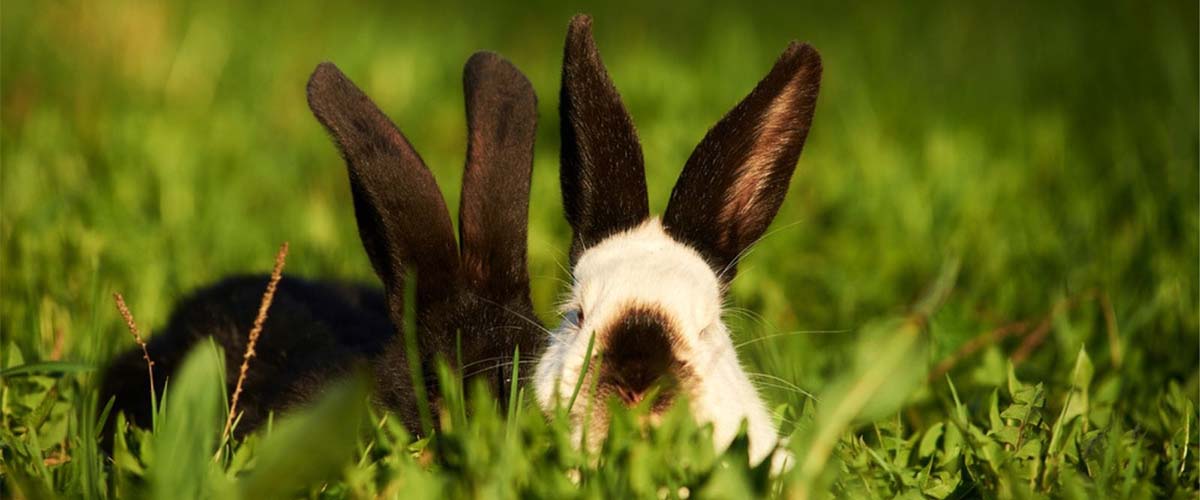Obesity in rabbits
Overview
- A third of pet rabbits in the UK are overweight, and as a result, at risk of health problems and a shorter lifespan.
- It’s important to keep your rabbits in shape by feeding them correctly, making sure they get enough exercise, and checking them regularly.
- If you are struggling to keep your rabbits a healthy weight, contact your vet or download our guide ‘Getting your rabbits into shape’.
Is my rabbit overweight?
To check if your rabbits are the correct weight you need to weigh them and check their body condition score (shape). Once you become familiar with their ideal weight and shape, it will be easy to assess whether they are gaining or losing. Follow our guide below:
- Look at your rabbit from the side and from above. They should have a waist.
- Feel under your rabbit’s tummy. It should go in, not bulge out.
- Feel along your rabbit’s side and back. You should be able to feel their ribs, spine and hip bones quite easily but they shouldn’t stick out.
- Feel the base of your rabbit’s tail where it meets the spine. There shouldn’t be a build-up of fat.

Causes
Weight gain in rabbits is nearly always because of too much food and too little exercise, and very rarely due to a medical problem. However, if you are worried about your rabbit, if they have gained weight for no obvious reason, or if you simply can’t get them to lose weight, it’s sensible to have them checked by your vet (especially to rule out pregnancy if you have an un-neutered female).
Health risks
Obesity in rabbits increases the risk of:
- Heart disease
- Arthritis
- Liver disease (Hepatic lipidosis)
- Flystrike
- Skin problems such as (urine scald and infections)
Exercise
Sadly, our research shows that 25% of rabbits in the UK are kept in small hutches with minimal or no run space. It’s important to give your rabbit lots of space to hop, skip, run, stretch and jump because otherwise they will spend most of their time bored, sitting still and gaining weight. Why not give them a bigger space, build a bigger run, or even rabbit proof your garden to let them have free range?
Read our advice on how to exercise your rabbit.
Diet
The best diet for overweight rabbits is:
- Their own body size in a mix of feeding hay and grass
- A small handful of fresh greens
- A tablespoon of commercial rabbit pellets (if necessary)
- Never muesli style diets
Read more about the ideal diet for rabbits.

Rabbits should never be fed a muesli style diet.
When to contact your vet
Contact your vet for an appointment if you are struggling to keep your rabbits in shape, they will be happy to help. Obesity is so common that many veterinary practices now offer specific weight clinics. Your rabbits should also have regular health checks (at least once a year), when your vet can check their weight and shape.
Cost
Overweight rabbits are likely to develop health problems and rack up vet bills. To keep costs down, ensure your rabbit is a healthy weight.
Consider insuring your rabbit as soon as you get them, before any signs of illness start. This will ensure you have support to care for them should any problems develop.
Summary
- Overweight rabbits are more likely to develop health problems.
- Feed your rabbits an appropriate diet (mostly grass and hay).
- Make sure they get lots of exercise and have space to run, hop and jump.
- Familiarise yourself with their healthy weight and shape (using our guide), and check them regularly.
- Contact your vet if you can't get them to lose weight (or if you're worried).
Published: January 2021
Did you find this page useful?
Tell us more
Please note, our vets and nurses are unable to respond to questions via this form. If you are concerned about your pet’s health, please contact your vet directly.
Thank you for your feedback
Want to hear more about PDSA and get pet care tips from our vet experts?
Sign up to our e-newsletter
Written by vets and vet nurses. This advice is for UK pets only. Illustrations by Samantha Elmhurst.

